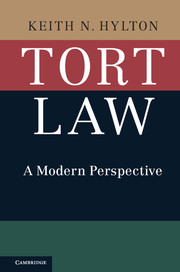Book contents
- Frontmatter
- Contents
- 1 Introduction
- 2 Policy and Tort Law
- 3 Evolution of Tort Law
- 4 Intentional Torts
- 5 Theoretical Foundations of Strict Liability
- 6 The Reasonable Person
- 7 Customs, Statutes, and the Reasonable Person
- 8 Inferring Negligence
- 9 Contributory Negligence and Assumption of Risk
- 10 Contributory Negligence, Comparative Negligence, and Incentives for Care
- 11 Joint and Several Liability, and Vicarious Liability
- 12 Factual Causation
- 13 Proximate Cause
- 14 Duty to Rescue and Special Relationships
- 15 Strict Liability: Conversion, Abnormally Dangerous Activities, and Nuisance
- 16 Defamation
- 17 Products Liability
- 18 Damages
- Index
17 - Products Liability
Published online by Cambridge University Press: 05 June 2016
- Frontmatter
- Contents
- 1 Introduction
- 2 Policy and Tort Law
- 3 Evolution of Tort Law
- 4 Intentional Torts
- 5 Theoretical Foundations of Strict Liability
- 6 The Reasonable Person
- 7 Customs, Statutes, and the Reasonable Person
- 8 Inferring Negligence
- 9 Contributory Negligence and Assumption of Risk
- 10 Contributory Negligence, Comparative Negligence, and Incentives for Care
- 11 Joint and Several Liability, and Vicarious Liability
- 12 Factual Causation
- 13 Proximate Cause
- 14 Duty to Rescue and Special Relationships
- 15 Strict Liability: Conversion, Abnormally Dangerous Activities, and Nuisance
- 16 Defamation
- 17 Products Liability
- 18 Damages
- Index
Summary
Early law on products liability, of roughly the mid-1800s, applied the privity rule. Under this rule, a seller of a product was responsible in negligence only to the party to whom he sold the product. As a result, consumers of defective products often lost their lawsuits against manufacturers, because they were not in privity of contract. Winterbottom v. Wright, a leading case, rejected a suit by a mail deliverer, brought against the supplier of mail coaches to the Postmaster-General, for injury resulting from a latent defect in a coach because the deliverer was not a party to the contract between the supplier and the Postmaster-General.
Almost from the moment the privity rule became established, exceptions began to appear. Judge Cardozo's MacPherson v. Buick Motor Co. opinion provides a fascinating description of the growth of exceptions to the privity rule, a growth that culminated in his own decision in MacPherson to effectively abolish the rule by giving one of its exceptions an extremely broad interpretation.
The privity rule may appear at first glance to have been a formalist doctrine unrelated to any functional purpose. However, the rule can be understood in functional terms using assumption of risk theory. The simple idea behind it is that in the absence of some warning from the intermediate purchaser about risks to others and an effort to get the original seller to accept responsibility for those risks, the original seller should not be assumed to accept responsibility for harms to third parties that the intermediate purchaser could have foreseen much easier than the original seller. For example, when Wright agreed to supply mail coaches to the Postmaster-General, he may not have known how often the coaches would be used, under what conditions (a defect under some circumstances might not be worrisome, while under others it would be), and by whom. If he were asked to guarantee compensation for injuries suffered by coach drivers, Wright would have inquired into these matters to get a sense of the scope of his liability. Once aware of the scope of liability, he would have priced the product accordingly, perhaps charging an especially high price for coaches that would be used on potholed roads in rural areas and a comparatively low price for coaches that would be used in well-paved cities.
- Type
- Chapter
- Information
- Tort LawA Modern Perspective, pp. 332 - 376Publisher: Cambridge University PressPrint publication year: 2016



